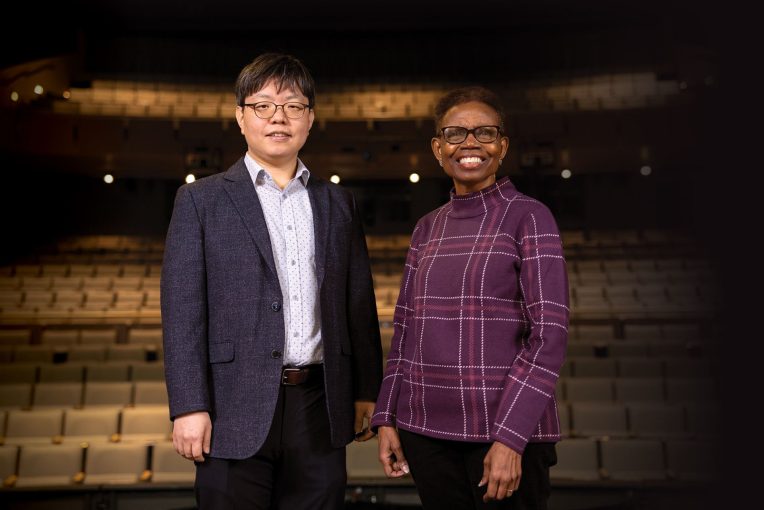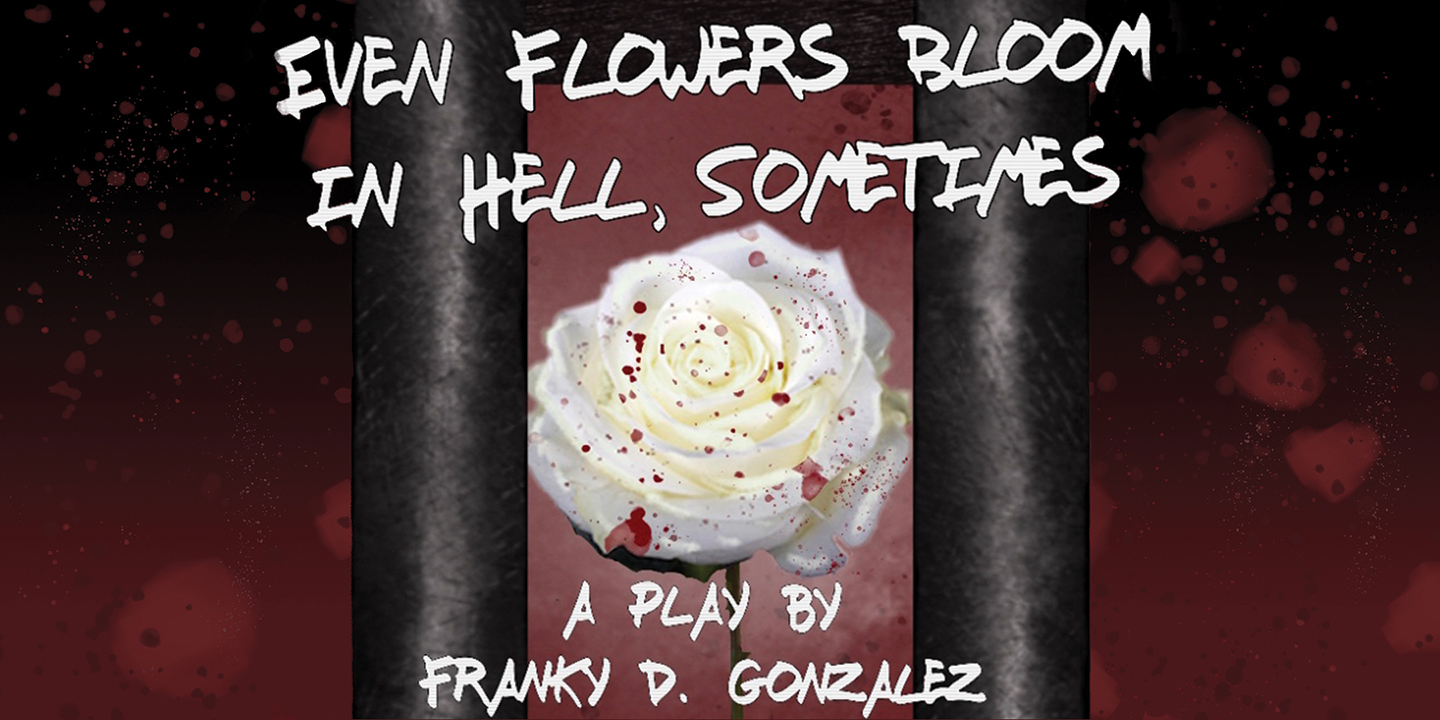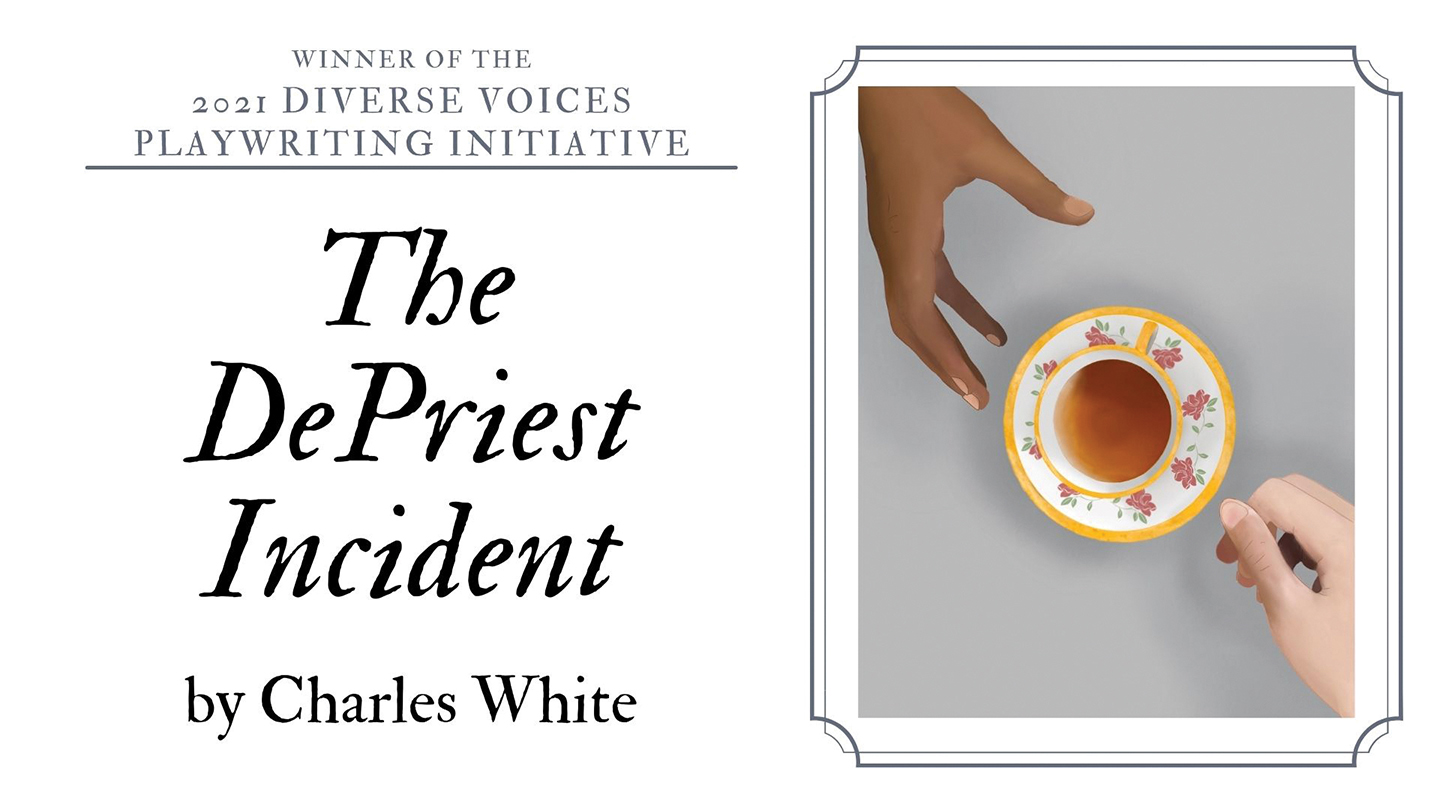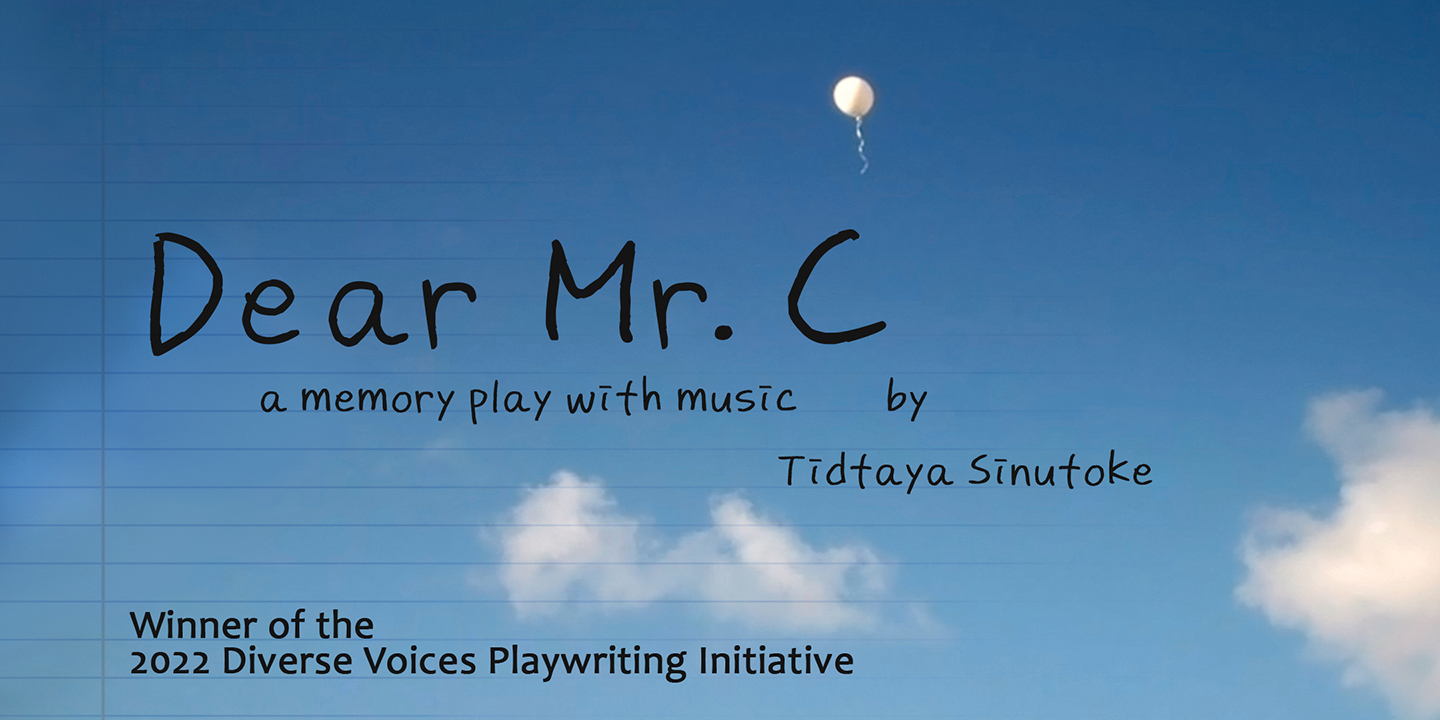By the time an actor steps onto the stage, thousands of hours of work and countless choices precede them. Before the first syllable is uttered to an audience shrouded in darkness, conversations have taken place to bring to light every detail, every idea.
The beginning comes with a decision. What play will we stage?
At Illinois State University, the Crossroads Project has advocated for diverse voices to be center stage for more than 20 years through the School of Theatre and Dance. The project has connected students to the work of national and international artists such as Ntozake Shange, August Wilson, Regina Taylor, Nilo Cruz, and Naomi Iizuka.
Appears In“There was definitely a need for multicultural art,” said Dr. Leslie Sloan Orr, who was the founding director of the University’s Crossroads Project in 2000. She arrived in fall of that year from Indiana State University, where she had created the Black Theatre Program. Orr previously worked with former Illinois State President Vic Boschini at Butler University. “Vic witnessed firsthand my theatre activities with African American students. When he became president at Illinois State, he wanted me to bring the same activities here.”
Along with her duties teaching playwriting and African American theatre as an associate professor at Illinois State, Orr set out to meet with faculty, staff, and students as well as Bloomington-Normal community members to understand what could best serve the University in raising the voices of BIPOC (Black, Indigenous, and people of color) playwrights and actors.
From the discussions, Orr organized the Crossroads Project as a standing committee in the School of Theatre (now the School of Theatre and Dance). Consisting of Illinois State faculty, staff, and students, the committee sought plays designed to deal with issues and experiences of those who were underrepresented in the United States or around the world.
“For me and the Crossroads committee, it became increasingly important for BIPOC communities to tell their own stories and be heard.”
Dr. Leslie Sloan Orr
“It was important for me that the first piece we performed represented the best of the ISU and Bloomington-Normal community,” said Orr. She worked with area Black churches and community theatres to bring to life Shange’s play for colored girls who have considered suicide / when the rainbow is enuf.
The Crossroads committee was tasked with recommending plays and playwrights for performance as part of the school’s Main Stage repertoire. Crossroads members would also support the production with programming that included guest artists working directly with Illinois State students and faculty. Visiting artists have included playwrights such as Manjula Padmanabhan, Lynn Nottage, and Adong Lucy Judith; choreographers Jack Gray and Dåkot-ta Alcantara-Camacho; and Kabuki master Shozo Sato.
“Crossroads always felt like home to me,” said Dr. Ann Haugo, director of the School of Theatre and Dance. Haugo started at Illinois State the same year as Orr, teaching U.S. theatre through the lens of gender, race, and class. She became one of the founding members of Crossroads and still serves on the committee. “We talked about the kind of work that is vital to broaden and revise the story of U.S. theatre. It’s where I live as a scholar.”
In the beginning, the committee would recommend a title to the school’s Production Committee every other year. As the years continued, Crossroads members worked to include more productions that focused on the BIPOC experience, both nationally and internationally.
During the 2013–2014 academic year, the Crossroads Project hosted the Diversity Dialogue Series: Advancing Diversity Consciousness in the Arts, inviting leading BIPOC artists to speak to the campus and community about equity, diversity, and inclusion in the fields of American theatre and dance.
“For me and the Crossroads committee, it became increasingly important for BIPOC communities to tell their own stories and be heard. I could not do this alone,” said Orr. She turned Crossroads over to Assistant Professor of Theatre Kee-Yoon Nahm in 2018. “I’m so thankful that Kee-Yoon and the other Crossroads members made my dream a reality.”
Diverse Voices Playwriting Initiative
In many ways, the evolution of the Crossroads Project might be seen as a mirror for society’s changing approach to diversity—edging from an awareness of the need to seek out traditionally silenced voices, and moving toward shaping initiatives from day one with the goal of sharing diverse experiences.
“I think the last few years in American theatre, we have felt a pretty major shift, as has all of society,” said Nahm. “Different times require different strategies.”
Nahm still serves as the Crossroads representative for the Production Committee, and the Crossroads committee still recommends plays for the Main Stage. The difference now is that the rest of the world is catching up to Orr’s original vision. “There is a strong consensus that a season of straight, white, male playwrights is unacceptable—a conviction that has only grown stronger in the past few years,” said Orr.
In 2018, Dr. Kim Pereira urged fellow members of the Crossroads committee to invite playwright Elizabeth Wong to campus—not with a finished play to perform, but with an outlined idea to workshop. A workshopped production can be a simplified version of a play, perhaps without sets or costumes. It can also be a staged reading where actors are part of the process of play development.
After consulting with long-standing Crossroads members, Nahm decided Wong’s visit could act as a pilot run of an entirely new program. Haugo, who became interim director of the school in 2019, agreed. “We were at a place where faculty and staff understood that the entire school needs to be focused on equity work,” she said. “That decision gave Crossroads room to do other things.”
In 2020, Crossroads launched the Diverse Voices Playwriting Initiative, which works to elevate theatre that explores BIPOC voices and experiences. “It is a year-round project that engages the contemporary work of playwrights without being limited by the Main Stage production requirements,” said Nahm.
In the fall, submissions are accepted in the form of sample pages. The Crossroads committee—including student members—reviews the entries, invites playwrights to submit a full play, and selects the winner. The winning playwright is invited to campus for a one-week residency the following spring that includes workshopping the play. The week culminates in a staged reading.
The workshopping approach, with theatre students and faculty taking part, opens up new avenues for playwrights, said Nahm. “Long before the first rehearsal, there are conversations with the playwright,” he said. “We ask where they are in the development process and what would help them the most.” During the residency, rehearsals take place in the evenings. This allows the playwright to continue development during the day, focusing on what they feel is most needed. “Playwrights set their own goals and expectations,” said Nahm.
The Crossroads committee initially worried the project would not get enough submissions. “We received more than 150 our first year,” Nahm said, adding they now cap the submissions at 100. “We learned that there are not enough opportunities out there promoting BIPOC voices, and how needed this initiative is.”
The inaugural winner of the award, Franky D. Gonzalez, called the experience, “tremendously rewarding.” Gonzalez, who resides near Dallas, won with his play Even Flowers Bloom in Hell, Sometimes. “I got to experience how strong the play was when a group of creatives made it their own,” he said. “With a beautiful and emotionally resonant reading, it was a wonderful journey to witness.”
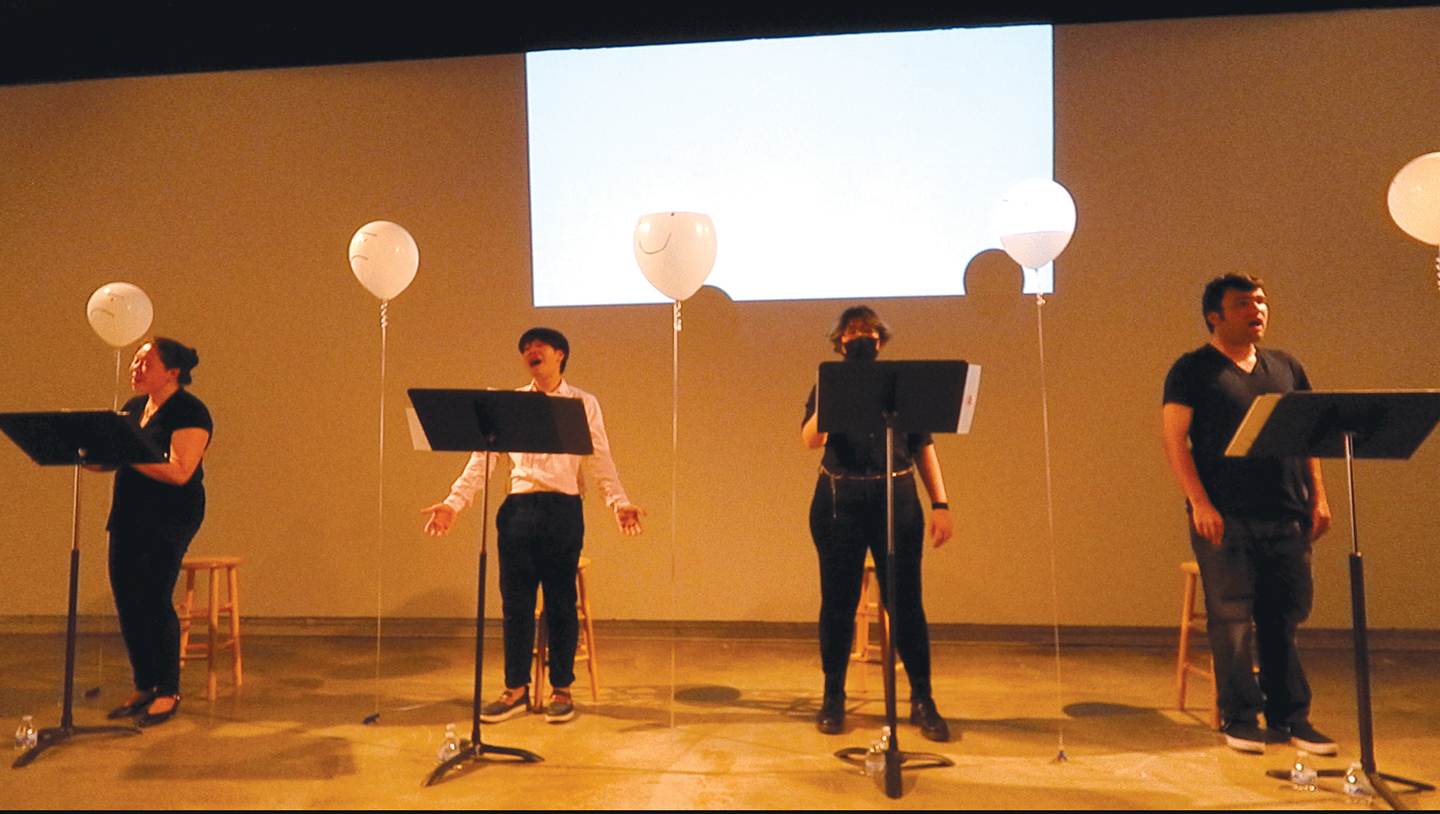
Though the award opened doors in his emerging career, Gonzalez said the lasting impact of winning Diverse Voices came in the form of connections. “So much of theatre is relationship-based,” said Gonzalez. “Any opportunity to deepen or create those friendships is going to do more for your career than any edit or rewrite.”
While the workshopping approach focuses on the needs of the playwright, the educational benefit to the students is immeasurable, said Nahm. “Diverse Voices teaches students that plays are more than just a practical document for production that somehow magically appears,” he said. “There is a person behind every play they experience, a person who pours their passion and identity into the work.”
Students also gain an understanding of the breadth of work and expression captured within theatre in the United States. “Because these plays are so wonderfully different from one another, they collectively demonstrate that there is no such thing as a Black play, Indigenous play, Latinx play, or Asian American play,” said Nahm. “Each playwright brings with them a different background, career path, and set of experiences.”
The work of Crossroads and Diverse Voices will continue with the aim to elevate those who are underrepresented in theatre. “Crossroads’ legacy will only be fully realized when there is not a need for Crossroads,” said Orr. “Once it is embraced simply as American theatre.”
